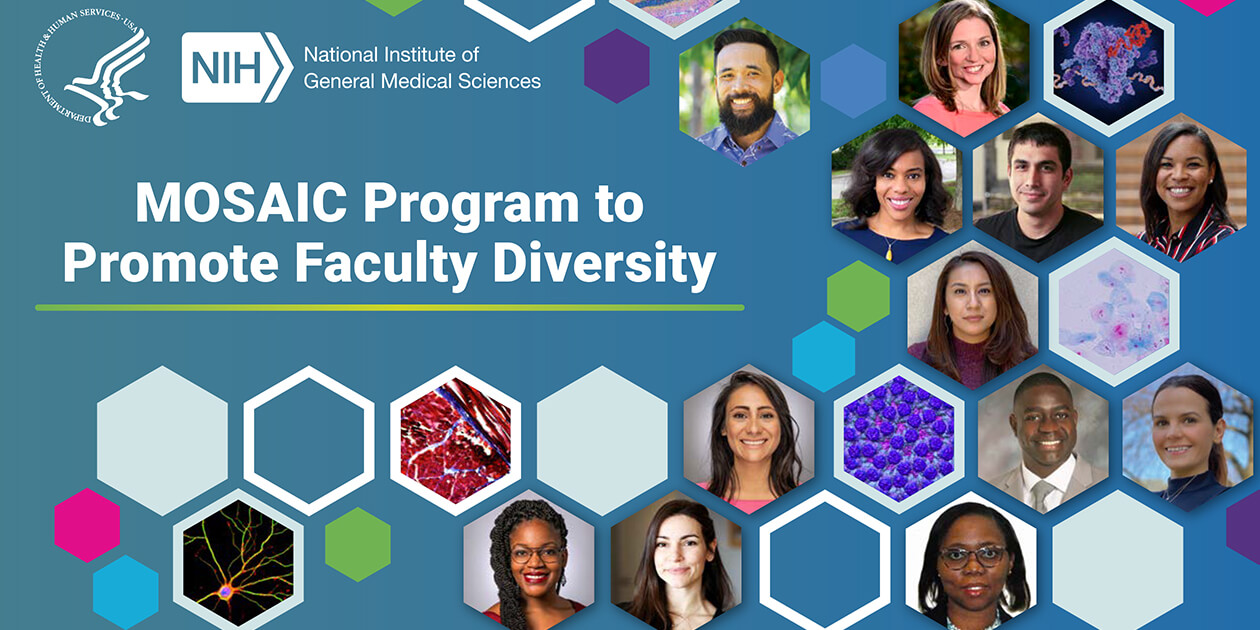MOSAIC Program
Maximizing Opportunities for Scientific and Academic Independent Careers Awards

The MOSAIC program, part of NIH’s efforts to enhance diversity within the academic biomedical research workforce, is designed to facilitate the transition of promising postdoctoral researchers from diverse backgrounds, including individuals from groups underrepresented in the biomedical research workforce at the faculty level, into independent faculty careers in research-intensive institutions.
The MOSAIC awards supported by NIMHD:
K99/R00 – MOSAIC Postdoctoral Career Transition Award to Promote Diversity
K99/R00 awards provide individuals in mentored, postdoctoral training positions up to five years of mentored career development and research support. NIMHD accepts applications for the MOSAIC K99/R00 award three times per year.
Please note, by the time of award, the individual must be a citizen or a non-citizen national of the United States or have been lawfully admitted for permanent residence (i.e., possess a currently valid Permanent Resident Card USCIS Form I-551, or other legal verification of such status).
- PAR-21-271 - MOSAIC Postdoctoral Career Transition Award to Promote Diversity (K99/R00 Independent Clinical Trial Not Allowed)
- PAR-21-272 - MOSAIC Postdoctoral Career Transition Award to Promote Diversity (K99/R00 - Independent Clinical Trial Required)
Program Details
MOSAIC scholars propose rigorous research and career development activities in the K99 phase of the applications. Along with mentors, they include a tailored career development plan. These early career scientists demonstrate compelling commitments and contributions to enhancing diversity, as well as substantive plans to continue these activities as part of their independent research careers.
Additionally, each scholar becomes part of a cohort-based career development program selected by the applicant to expand their professional networks and gain additional skills and mentoring through programs administered by MOSAIC UE5 awardees:
- American Society for Biochemistry and Molecular Biology
- American Society for Cell Biology
- Association of American Medical Colleges
The National Institute on General Medical Sciences (NIGMS) coordinates affiliation of MOSAIC K99/R00 recipients from all NIH participating Institutes and Centers with the UE5 grants.
Eligibility & Application Information
Scholars must have no more than four years of postdoctoral research experience at the time of the application. Candidates are strongly encouraged to apply no later than the third year of their postdoctoral training to ensure awardees receive maximum benefit from both the K99 phase of the award, and to facilitate a timely transition to independence.
The K99/R00 award is intended for individuals who require at least 12 months of mentored research training and career development (K99 phase) before transitioning to the R00 award phase of the program. Consequently, the strongest applicants will require and propose a well-conceived plan for one to two years of substantive mentored research training and career development that will help them become competitive candidates for tenure-track faculty positions and prepare them to launch robust, independent research programs.
Page updated July 8, 2024
















